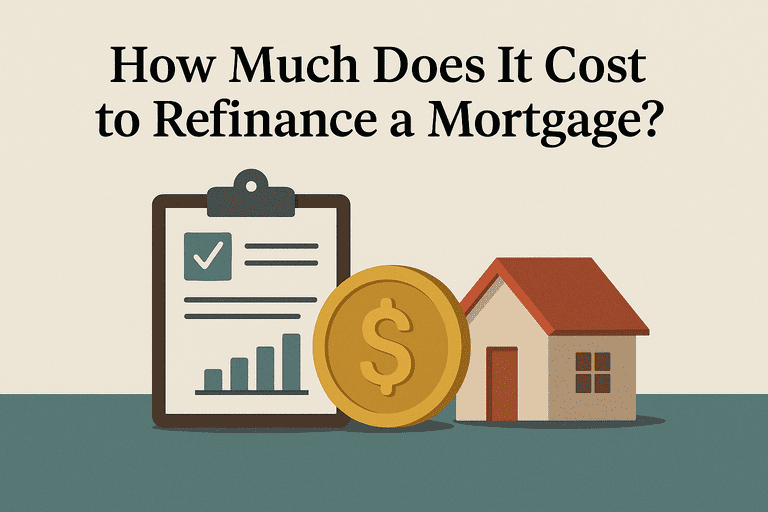Understanding how much it costs to refinance a mortgage is crucial before you decide to replace your existing home loan. Refinancing can lower your monthly payment, help you access home equity, or change your loan type, but it comes with upfront expenses. Knowing the typical refinance costs, what influences them, and how to minimize fees will help you make the best financial decision.
Typical Cost to Refinance a Mortgage
The cost to refinance a mortgage generally ranges from 2% to 6% of your new loan amount
. For example, if you refinance a $200,000 mortgage, your closing costs could fall between $4,000 and $12,000. These costs are similar to what you paid when you first obtained your mortgage and are due at closing.
Common Refinance Closing Costs and Fees
Refinancing involves a mix of lender fees, third-party charges, and government or legal expenses. Here’s a breakdown of typical refinance costs:
| Fee Type | Typical Cost Range |
|---|---|
| Application fee | $75 – $500 |
| Origination/underwriting fee | $300 – $900 (or 1–1.5% of loan) |
| Credit report fee | $10 – $100 per borrower |
| Home appraisal fee | $225 – $1,000 |
| Title search and insurance | $300 – $2,000 |
| Survey fee | $150 – $400 |
| Attorney/settlement fee | $500 – $1,000 |
| Recording fee | $25 – $250 |
| Document preparation fee | $50 – $600 |
| Flood certification fee | $15 – $50 |
Note: Some costs, like prepaid property taxes and homeowners insurance, are recurring homeownership expenses but may be collected at closing.
Factors That Affect How Much It Costs to Refinance a Mortgage
Several factors influence your total refinance costs:
Loan amount: Larger loans mean higher percentage-based fees.
Location: Fees like title insurance and recording vary by state or province.
Lender: Each lender sets its own rates and fee structures.
Type of refinance: Cash-out refinances often have higher rates and costs than rate-and-term refinances.
Credit score: Higher credit scores can qualify you for lower rates and fees.
Loan type and term: Shorter terms and smaller loans usually come with better rates.
Prepayment Penalties and Other Potential Costs
Some mortgages, especially in Canada or on older loans, may include prepayment penalties for paying off your loan early. These penalties can range from a few hundred to several thousand dollars, depending on your lender and how early you refinance. Always check your current loan agreement for any prepayment clauses.
Can You Roll Refinance Costs Into Your New Loan?
Many lenders allow you to roll closing costs into your new mortgage, reducing the amount you pay upfront. However, this increases your loan balance and the total interest paid over time. You’ll need enough home equity to qualify for a larger loan if you choose this option.
How to Save on the Cost to Refinance a Mortgage
Shop around: Compare quotes from at least three lenders to find the lowest rates and fees.
Negotiate fees: Some lenders may waive or reduce application, origination, or appraisal fees.
Boost your credit score: Higher scores can unlock better rates and lower costs.
Consider lender credits: Some lenders offer credits to cover closing costs in exchange for a slightly higher interest rate.
Time your refinance: Avoid prepayment penalties by refinancing at the end of your loan term, or ask about “blend and extend” options if available.
When Does Refinancing Make Financial Sense?
Before refinancing, calculate your break-even point—the time it takes for your monthly savings to exceed your upfront costs. For example, if refinancing saves you $200 per month and costs $5,000, your break-even point is 25 months. If you plan to stay in your home longer than this, refinancing may be worthwhile.
Frequently Asked Questions: How Much Does It Cost to Refinance a Mortgage?
Q: What is the average cost to refinance a mortgage in 2025? A: Most homeowners pay between 2% and 6% of the new loan amount in closing costs, or $3,000 to $9,000 on a $150,000 loan.
Q: Are there no-closing-cost refinance options? A: Some lenders offer “no-closing-cost” refinances, but you’ll pay a higher interest rate or roll costs into your loan.
Q: Do I need a new appraisal to refinance? A: Most lenders require a new appraisal to determine your home’s current value, which typically costs $300–$1,000.
Conclusion
Knowing how much it costs to refinance a mortgage helps you make a smart financial decision. Expect to pay 2%–6% of your loan amount in closing costs, but shop around and negotiate to minimize expenses. Always calculate your break-even point and consider long-term savings before moving forward with a refinance.
